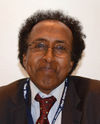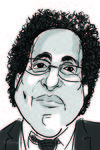Mohamed Ibrahim: Difference between revisions
Mibrahim4758 (talk | contribs) No edit summary |
Mibrahim4758 (talk | contribs) No edit summary |
||
| Line 17: | Line 17: | ||
Mr. Ibrahim has been in the IT industry for 2 decades; worked at PNG Elcom, Kuwait Oil Company (80s-90s). Also in the Public sector; Victorian Government's Health Supernnaution Board ('80s), and CIO at Peninsula Heath (98-2003). IT strategy Manager at Deakin University, hon senior lecturer at Monash University, Lecturer/EdTech at Higher Colleges of Technology, UAE. <ref>[http://www.linkedin.com/in/mi2000 LinkedIn.com]</ref> | Mr. Ibrahim has been in the IT industry for 2 decades; worked at PNG Elcom, Kuwait Oil Company (80s-90s). Also in the Public sector; Victorian Government's Health Supernnaution Board ('80s), and CIO at Peninsula Heath (98-2003). IT strategy Manager at Deakin University, hon senior lecturer at Monash University, Lecturer/EdTech at Higher Colleges of Technology, UAE. <ref>[http://www.linkedin.com/in/mi2000 LinkedIn.com]</ref> | ||
===Current Work=== | ===Current Work=== | ||
Mr. Ibrahim was contracted to re-establish and modernize the Somalian [[registry]], which has only been active since June 2010; he | Before elected to become the Minister of Post and Telecommunication, Mr. Ibrahim was an advisor to the previous 4 ministers of telecommunication. As a part of his other assignments, he was contracted to re-establish and modernize the Somalian [[registry]], which has only been active since June 2010; he led a number of important development projects. These include working to implement the fast track process for Somalia's Arabic based [[IDN]], and launching an innovative program to give free email accts and websites to all Somalis. The latter project involves giving individual domains based on their first and last names under the .me.so domain space; getting the Somali National TV online.<ref>[[ICANN 41]] Interview</ref> Thus, he is still involved in both updating and implementing the basics necessary for the .so registry, as well as making .so available to the Somali community at large, albeit from strategic and policy level<ref>[http://ccnso.icann.org/node/23141 ccNSO.ICANN.org]</ref> and trying to give Somalia the opportunity to lead unique projects, i.e., e-learning initiatives for the education sector, online visa processing and other gov e-business initiatives in the near future. | ||
===Interests=== | ===Interests=== | ||
While much of his career has been spent in the ICT sector, his interests as a scholar extend to globalization, the role of NGOs in developing countries, the place of ethics and morality in society, religious radicalism, and other areas where technology and humanity intersect and lately slowly moving into the legal field, updated his academic credentials recently, Masters of Public and International law from Melbourne Univeristy Law School .<ref>[http://arts.monash.edu.au/politics/terror-research/proceedings/biographies.php Arts.Monash.edu.au]</ref> His various projects involving Somalia stem from his interest in establishing functioning ICT and education systems there.<ref>[https://elists.isoc.org/pipermail/chapter-delegates/2010-July/006485.html eLists.isoc.org]</ref> He is also interested in wireless technology and it's potential to create opportunities for communication, and how that is balanced with its negative tendency to distract and saturate society.<ref>[http://www.elon.edu/e-web/predictions/igf_2010/survey_mobile.xhtml Elon.edu}</ref> | While much of his career has been spent in the ICT sector, his interests as a scholar extend to globalization, the role of NGOs in developing countries, the place of ethics and morality in society, religious radicalism, and other areas where technology and humanity intersect and lately slowly moving into the legal field, updated his academic credentials recently, Masters of Public and International law from Melbourne Univeristy Law School .<ref>[http://arts.monash.edu.au/politics/terror-research/proceedings/biographies.php Arts.Monash.edu.au]</ref> His various projects involving Somalia stem from his interest in establishing functioning ICT and education systems there.<ref>[https://elists.isoc.org/pipermail/chapter-delegates/2010-July/006485.html eLists.isoc.org]</ref> He is also interested in wireless technology and it's potential to create opportunities for communication, and how that is balanced with its negative tendency to distract and saturate society.<ref>[http://www.elon.edu/e-web/predictions/igf_2010/survey_mobile.xhtml Elon.edu}</ref> | ||
Revision as of 05:39, 27 July 2014
 |
 | ||
| Country: | Somalia | ||
| Email: | mi [at] ayuub.org | ||
| Website: | |||
| LinkedIn: | |||
| |||
Mohamed Ibrahim is Somalia's Minister of Posts and Telecomunication. Founding Chairman of ISOC Somalia,[1] the Project Manager of the .so registry,[2] a Research Fellow at University of Melbourne, was the Chairman of the Centre for Research and Dialogue,[3] and Somalia's IGF[4][5][6]He has attended a number of ICANN conferences, and is becoming involved in the ccNSO and GAC on behalf of Somalia;[7][8] he also represents the country at other fora, such as in AfTLD.[9]
Mr. Ibrahim has been in the IT industry for 2 decades; worked at PNG Elcom, Kuwait Oil Company (80s-90s). Also in the Public sector; Victorian Government's Health Supernnaution Board ('80s), and CIO at Peninsula Heath (98-2003). IT strategy Manager at Deakin University, hon senior lecturer at Monash University, Lecturer/EdTech at Higher Colleges of Technology, UAE. [10]
Current Work
Before elected to become the Minister of Post and Telecommunication, Mr. Ibrahim was an advisor to the previous 4 ministers of telecommunication. As a part of his other assignments, he was contracted to re-establish and modernize the Somalian registry, which has only been active since June 2010; he led a number of important development projects. These include working to implement the fast track process for Somalia's Arabic based IDN, and launching an innovative program to give free email accts and websites to all Somalis. The latter project involves giving individual domains based on their first and last names under the .me.so domain space; getting the Somali National TV online.[11] Thus, he is still involved in both updating and implementing the basics necessary for the .so registry, as well as making .so available to the Somali community at large, albeit from strategic and policy level[12] and trying to give Somalia the opportunity to lead unique projects, i.e., e-learning initiatives for the education sector, online visa processing and other gov e-business initiatives in the near future.
Interests
While much of his career has been spent in the ICT sector, his interests as a scholar extend to globalization, the role of NGOs in developing countries, the place of ethics and morality in society, religious radicalism, and other areas where technology and humanity intersect and lately slowly moving into the legal field, updated his academic credentials recently, Masters of Public and International law from Melbourne Univeristy Law School .[13] His various projects involving Somalia stem from his interest in establishing functioning ICT and education systems there.[14] He is also interested in wireless technology and it's potential to create opportunities for communication, and how that is balanced with its negative tendency to distract and saturate society.[15]
References
- ↑ isoc.org
- ↑ elists.isoc.org
- ↑ Arts.Monash.edu.au
- ↑ ICANN 41 Interview
- ↑ aftld.org
- ↑ linkedin.com
- ↑ registration123.com
- ↑ registration123.com
- ↑ AfTLD.org
- ↑ LinkedIn.com
- ↑ ICANN 41 Interview
- ↑ ccNSO.ICANN.org
- ↑ Arts.Monash.edu.au
- ↑ eLists.isoc.org
- ↑ [http://www.elon.edu/e-web/predictions/igf_2010/survey_mobile.xhtml Elon.edu}
